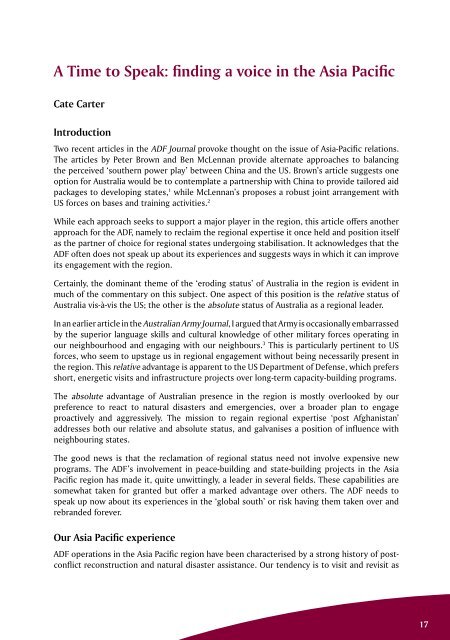ISSUE 191 : Jul/Aug - 2013 - Australian Defence Force Journal
ISSUE 191 : Jul/Aug - 2013 - Australian Defence Force Journal
ISSUE 191 : Jul/Aug - 2013 - Australian Defence Force Journal
- No tags were found...
Create successful ePaper yourself
Turn your PDF publications into a flip-book with our unique Google optimized e-Paper software.
A Time to Speak: finding a voice in the Asia Pacific<br />
Cate Carter<br />
Introduction<br />
Two recent articles in the ADF <strong>Journal</strong> provoke thought on the issue of Asia-Pacific relations.<br />
The articles by Peter Brown and Ben McLennan provide alternate approaches to balancing<br />
the perceived ‘southern power play’ between China and the US. Brown’s article suggests one<br />
option for Australia would be to contemplate a partnership with China to provide tailored aid<br />
packages to developing states, 1 while McLennan’s proposes a robust joint arrangement with<br />
US forces on bases and training activities. 2<br />
While each approach seeks to support a major player in the region, this article offers another<br />
approach for the ADF, namely to reclaim the regional expertise it once held and position itself<br />
as the partner of choice for regional states undergoing stabilisation. It acknowledges that the<br />
ADF often does not speak up about its experiences and suggests ways in which it can improve<br />
its engagement with the region.<br />
Certainly, the dominant theme of the ‘eroding status’ of Australia in the region is evident in<br />
much of the commentary on this subject. One aspect of this position is the relative status of<br />
Australia vis-à-vis the US; the other is the absolute status of Australia as a regional leader.<br />
In an earlier article in the <strong>Australian</strong> Army <strong>Journal</strong>, I argued that Army is occasionally embarrassed<br />
by the superior language skills and cultural knowledge of other military forces operating in<br />
our neighbourhood and engaging with our neighbours. 3 This is particularly pertinent to US<br />
forces, who seem to upstage us in regional engagement without being necessarily present in<br />
the region. This relative advantage is apparent to the US Department of Defense, which prefers<br />
short, energetic visits and infrastructure projects over long-term capacity-building programs.<br />
The absolute advantage of <strong>Australian</strong> presence in the region is mostly overlooked by our<br />
preference to react to natural disasters and emergencies, over a broader plan to engage<br />
proactively and aggressively. The mission to regain regional expertise ‘post Afghanistan’<br />
addresses both our relative and absolute status, and galvanises a position of influence with<br />
neighbouring states.<br />
The good news is that the reclamation of regional status need not involve expensive new<br />
programs. The ADF’s involvement in peace-building and state-building projects in the Asia<br />
Pacific region has made it, quite unwittingly, a leader in several fields. These capabilities are<br />
somewhat taken for granted but offer a marked advantage over others. The ADF needs to<br />
speak up now about its experiences in the ‘global south’ or risk having them taken over and<br />
rebranded forever.<br />
Our Asia Pacific experience<br />
ADF operations in the Asia Pacific region have been characterised by a strong history of postconflict<br />
reconstruction and natural disaster assistance. Our tendency is to visit and revisit as<br />
17

















